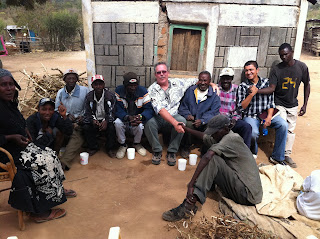 I had lunch yesterday with Kevin Haah, lead pastor of New Life Christian Church (www.newcitychurchla.com) in downtown Los Angeles. Kevin is the church planter of this multi-ethnic, multi-cultural, multi-socio-economic congregation that's grown to about 250 in just a few years. New Life is a breath of fresh air on the streets of LA, and is a significant expression of hope in a culture that is in such great need.
I had lunch yesterday with Kevin Haah, lead pastor of New Life Christian Church (www.newcitychurchla.com) in downtown Los Angeles. Kevin is the church planter of this multi-ethnic, multi-cultural, multi-socio-economic congregation that's grown to about 250 in just a few years. New Life is a breath of fresh air on the streets of LA, and is a significant expression of hope in a culture that is in such great need.Kevin and I talked about a new plan to involve churches in a church planting network (CPN) that would dream, plan, fund and encourage a collection of new church plants in the Los Angeles area. We also talked about the urban church, and God's design and plan for it. We talked about examples from the book of Acts, from Jerusalem to Antioch and beyond. And we marveled at the ability of that first church to transcend class and cultural boundaries to demonstrate a community unlike anything the world had seen.
We talked about Acts 16 and the first "members" of the church in the city of Philippi. The first person mentioned was Lydia, a seller of purple (Kevin called her a fashion executive!) who opened her small group of Jews to Paul in a gathering by the river (there was no synagogue in the city where the Jews could meet). Lydia was a businesswoman, a woman of influence and position and a Jew. And she found new direction and hope in the message Paul offered.
 The second person impacted was a slave girl with a demonic spirit that allowed her foretell the future. Her owners made their living from her abilities...until Paul cast that evil spirit from her and gave her the chance to be what God had designed her to be. This girl was homeless, bottom-of-the-barrel, even less than human in the eyes of those around her. Yet in Christ she now found her meaning value.
The second person impacted was a slave girl with a demonic spirit that allowed her foretell the future. Her owners made their living from her abilities...until Paul cast that evil spirit from her and gave her the chance to be what God had designed her to be. This girl was homeless, bottom-of-the-barrel, even less than human in the eyes of those around her. Yet in Christ she now found her meaning value.For all their work with this girl, Paul and Silas got tossed into prison, where their willingness to remain intact following the earthquake that freed all the inmates, gave them opportunity to share good news with their jailer and bring him and his family to salvation in Christ. That man was a blue-collar company man, part of the dominant class, a man who managed the violence of life. But he found his peace through the Prince of Peace.
A female Jewish entrepreneur. A demonized riff-raff slave. A government enforcer. As different from each other as possible. Yet they were cornerstone pieces of what was to become the Philippian church. God never intended for his people to have to look like each other on the outside. To have life experiences in common. To have to come from the same race, culture, class or life direction. In fact, his power and glory are much more powerfully demonstrated when those of us from vastly varied backgrounds find unity and oneness through what he's done for us. Through his sacrifice. His death. His gift of life for the world that he loves so much.
And when we gather around what we do have in common- a Savior who has called us, redeemed us and commissioned us- we create a community unlike anything the world understands. A community where "natural" barriers (e.g. race, culture, class, education, income) mean increasingly less and where love, acceptance, partnership and mutual edification take center stage. Urban churches...and maybe more and more churches everywhere...must reflect this kind of look, because in so doing we reflect our immediate community. And in so doing, we also reflect the bigger picture that will one day envelope all those who claim allegiance to Jesus. That's heaven, of course.
And if you don't feel comfortable with what I've described now, you're really gonna be disappointed on that Day.








